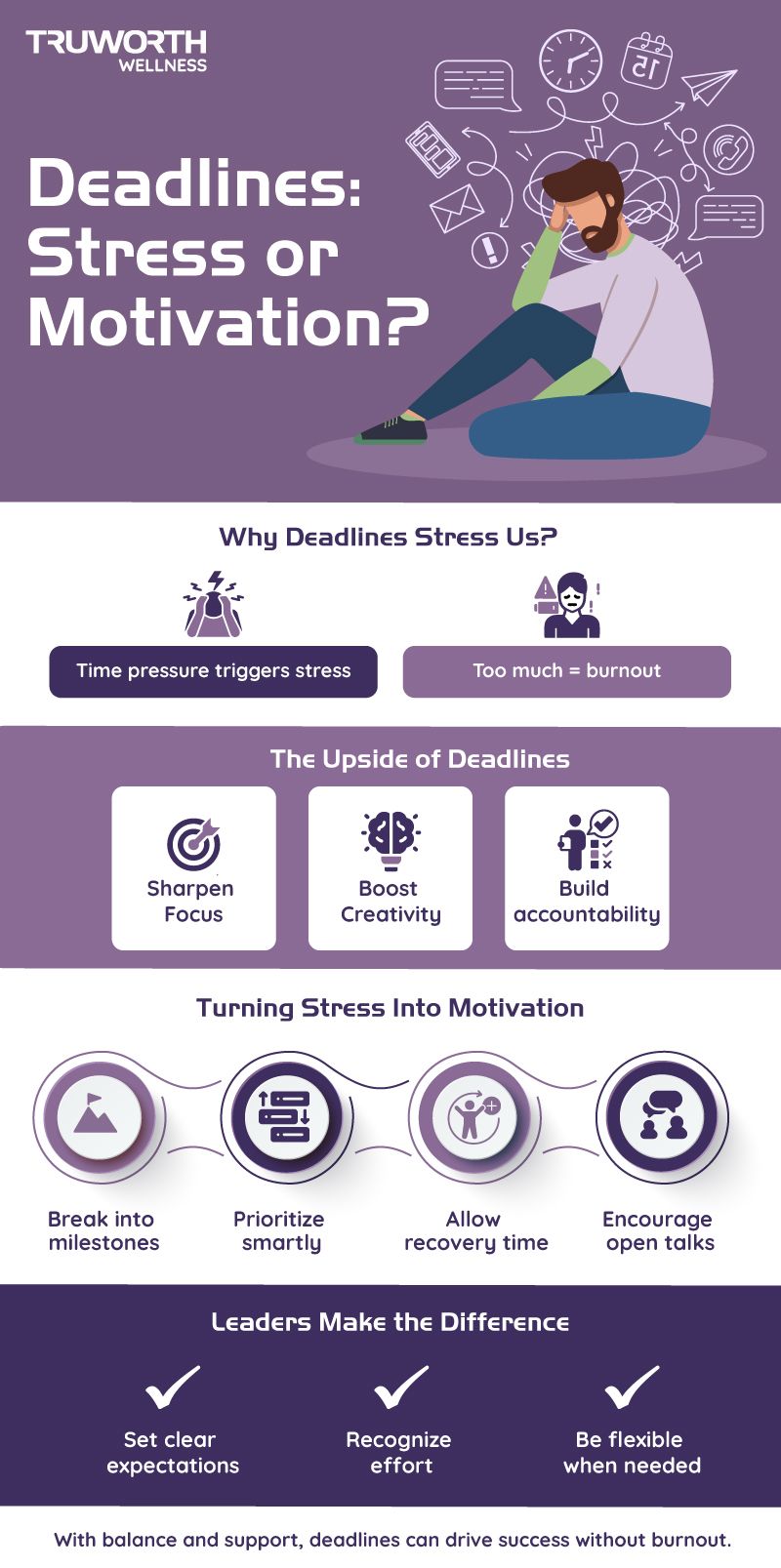The Psychology Of Deadlines: Turning Stress Into Motivation Without Burnout

Deadlines are a part of almost every job. They keep work moving, ensure that projects are delivered on time, and hold people accountable. But let’s be honest—just hearing the word “deadline” can make our heart rate go up a little. For some, deadlines act like fuel, pushing them to focus and deliver their best work. For others, they can feel like a weight, causing stress, anxiety, and even burnout.
So why do deadlines affect us so differently? The answer lies in psychology. How we perceive and handle deadlines has a lot to do with whether they motivate us or drain us. If managed well, deadlines can actually become a source of energy, creativity, and focus. If managed poorly, they can create exhaustion, mistakes, and disengagement.

Why Deadlines Stress Us Out?
Deadlines are essentially time pressure, and our brains are wired to react strongly to pressure. When we are reminded of limited time, our body releases stress hormones like adrenaline. This sharpens our focus, gives us a burst of energy, and pushes us into action. In short bursts, this is a good thing. It is the reason many of us can get a lot done right before a deadline. Psychologists call this the Yerkes-Dodson Law, which suggests that performance improves when stress is at a moderate level.
The problem begins when deadlines are too frequent, too unrealistic, or too intense. Instead of a quick burst of healthy urgency, employees may feel like they are running on stress all the time. This constant state of pressure quickly turns into fatigue and burnout. The very thing that was supposed to improve performance ends up damaging it.
When Deadlines Become a Source of Motivation?
Not all stress is bad. When deadlines are designed thoughtfully, they can actually encourage people to bring out their best. Here are some of the positive effects of deadlines:
- Improved focus: Knowing that time is limited helps people cut out distractions and concentrate on what matters most.
- Creative thinking: A little bit of time pressure often sparks innovative ideas because it forces people to think outside their usual patterns.
- Accountability: Deadlines create responsibility. Teams know they need to show results, which increases ownership.
- Momentum: Completing one task within a deadline creates a sense of achievement that fuels motivation for the next one.
In this way, deadlines can act as powerful motivators. But the difference between motivating and overwhelming often depends on how they are structured.
The Fine Line Between Productivity and Burnout
The real challenge is that deadlines are not equal for everyone. Some deadlines push employees to achieve their best, while others push them to exhaustion. What makes the difference is often three things:
- Clarity: Clear, well-communicated deadlines help employees understand exactly what is expected. Vague timelines, on the other hand, cause confusion and unnecessary stress.
- Control: When employees feel they have no say in how deadlines are set, it can create a sense of powerlessness. When they are involved in planning, they feel more ownership and less resistance.
- Support: A deadline that comes without the resources or guidance needed to achieve it can feel unfair. With the right support, the same deadline becomes manageable and even motivating.
Leaders who understand these factors are better able to use deadlines as a tool for productivity rather than pressure.
How to Turn Deadline Stress into Motivation?
The good news is that both employees and organizations can learn to make deadlines work in their favor. Here are some practical strategies:
1. Break down big goals
Huge deadlines often feel overwhelming. Breaking them into smaller milestones creates manageable steps, making progress more visible and reducing last-minute panic.
2. Frame deadlines positively
How we talk about deadlines changes how people perceive them. Instead of saying, “We cannot afford to miss this or we fail,” leaders can reframe it as, “This is our chance to show what we are capable of.” That small shift reduces fear and adds motivation.
3. Prioritize instead of multitasking
Trying to meet too many deadlines at once often lowers the quality of work. Clear prioritization helps employees focus on what matters most and deliver better results.
4. Include recovery time
Deadlines should not feel like one continuous sprint. Allowing for short breaks or recovery periods after intense deadlines ensures employees do not burn out and are ready for the next challenge.
5. Encourage autonomy
When employees are given some control in setting or negotiating timelines, they are more engaged and motivated. Even a little flexibility can go a long way in reducing stress.
6. Use technology wisely
Tools like project management platforms, shared calendars, and automated reminders reduce the chaos of tracking deadlines. With better organization, employees can spend their energy on doing the work itself.
7. Normalize open conversations
Employees should feel safe talking about unrealistic timelines or workload challenges. When leaders encourage open discussions, deadlines become more realistic and less intimidating.
The Role of Leaders in Shaping Deadline Culture
Leadership has a huge influence on whether deadlines feel like healthy challenges or unfair demands. Good leaders know that setting deadlines is not just about dates on a calendar, but about guiding people toward results while protecting their well-being.
- Lead by example: Leaders who manage their own deadlines with balance show their teams how to do the same.
- Recognize effort, not just results: Meeting a deadline is important, but so is the hard work that goes into it. Recognition of effort keeps employees motivated.
- Be flexible when needed: Sometimes circumstances change, and adjusting deadlines is the smarter option. Leaders who show understanding build trust.
- Promote balance: Employees should not feel that meeting a deadline means sacrificing their personal life. Leaders can encourage balance by respecting boundaries.
When leaders adopt these practices, deadlines shift from being stressful ultimatums to meaningful milestones.
Rethinking Deadlines for the Modern Workplace
In many organizations, deadlines have long been associated with hustle, all-nighters, and last-minute pressure. But today’s workforce values well-being as much as achievement. If companies want sustainable success, they need to evolve how they think about deadlines.
This means designing realistic timelines, prioritizing wellness, and focusing on smart work rather than long hours. A culture where deadlines are fair, clear, and motivating leads to higher engagement, better productivity, and lower turnover. Employees begin to see deadlines not as threats but as opportunities to achieve and grow.
Final Thoughts
Deadlines will always be part of the workplace. They are necessary to keep things moving and to deliver results. But their impact on people depends on how they are managed. Deadlines can be powerful motivators, helping people focus, innovate, and achieve. They can also be harmful, leading to stress and burnout if they are unrealistic or unsupported.
The psychology of deadlines shows us that stress is not always bad—it can fuel performance when balanced. What matters is clarity, fairness, and support. Organizations that understand this will create workplaces where deadlines inspire rather than exhaust.
At Truworth Wellness, we help organizations find this balance by building workplace strategies that combine productivity with employee well-being. From stress management programs to leadership coaching, we equip teams to handle deadlines in a healthy, sustainable way. Connect with us today to create a culture where deadlines motivate without burning people out.